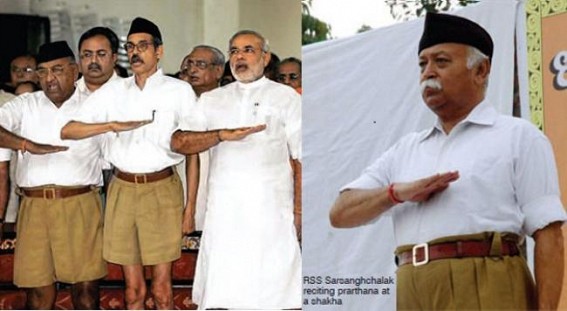Amulya Ganguli

PHOTO : Narendra Modi is RSS style. File Photo
The rise in the growth rate to the moderately satisfactory 6.3 per cent from the depressingly low 5.7 per cent is good news for the Bharatiya Janata Party (BJP) at a time when the Prime Minister reminded the audience at a function organised by a media house about former President A.P.J. Abdul Kalam's observation about the negativism which generally marked newspapers and magazines.
Narendra Modi's case for a more positive outlook in the media and the country will seem more credible in the context of the latest growth figures if only because they highlight the mistake of those like former Finance Minister Yashwant Singh of the BJP, who have been lamenting (perhaps with a touch of schadenfreude) about the economy's free fall.
As Finance Minister Arun Jaitley has said, the country's emergence from the recent slump means that it has got over the twin blows of demonetisation and the Goods and Services Tax (GST), which were expected by Modi's critics to spell his doom.
The turn for the better in the economy has come at the right time for the BJP when its frenetic campaigning in Gujarat with Modi addressing 30 meetings in a fortnight and with as many as 40 cabinet ministers camping in the state, pointed to a measure of uneasiness in the party about its prospects in what is widely regarded as its bailiwick.
However, considering that the BJP's success in Gujarat and Himachal Pradesh is almost a foregone conclusion, one can say that the rise in the growth rate will not make much of a difference to the outcome. All that it can do is to dampen some of the ardour of the ruling party's opponents.
Even then, the point remains that the BJP will face its real challenge not in Gujarat or Himachal Pradesh this month, but in Rajasthan, Madhya Pradesh and Chhattisgarh next year. It is in those elections, where the BJP will encounter the anti-incumbency factor, that it will become clear whether the rise in the growth rate has helped the party or is of little consequence.
The reason for the doubts is that it is not clear to what extent the unemployment problem will be mitigated by the climbing growth rate in these days of automation and artificial intelligence.
Equally uncertain is the quantum of the impact on the BJP's hopes as a result of the prevailing tension and uncertainty caused by the crime rate -- and especially the safety of women and even children.
The effect of the rampaging Hindutva hardliners declaring bounties on the heads of actors and directors is another unknown factor whose effect will be known only after the votes are counted.
Up till now the BJP has been sitting pretty because its "vikas" (development) plank still has many takers even if it hasn't made a perceptible dent on the unemployment scene. In addition, Modi's personal popularity remains high because of his oratorical skills and the impression he conveys about the seriousness of his intent to take the country forward.
In contrast, his opponents lack an agenda which can have an inspiring effect and are bereft of leaders capable of drawing enthusiastic crowds although Rahul Gandhi is showing signs of the old Nehruvian appeal.
The opposition depends therefore on, first, the economy continuing to be sluggish and, secondly, on the Hindutva hotheads creating a ruckus. But such an approach is obviously a negative one, as is also banking on the anti-incumbency factor to undermine the BJP-run state governments. There is little hope, therefore, for the opposition if it cannot adopt a positive attitude with a clear projection of the kind of India which it envisages.
For the BJP, on the other hand, it is a tug-of-war between vikas and the hotheads. As long as the economy shows signs of buoyancy, it can expect to be home and dry. It is of the utmost importance for it, therefore, to ensure that the recovery doesn't flag and that the country regains its status as the fastest-growing economy in the world.
At the same time, the party cannot allow the loonies in its ranks, who include ministers, to run amok. It does not reflect well on a government when the apex court has to direct the states to check cow vigilantes or tell senior politicians in the ruling dispensation to keep their mouths shut on yet-to-be released films lest they influence the censor board.
As it is, the impression persists that the government is not too comfortable with the autonomy of established institutions as could be seen from the official directive to the University Grants Commission (UGC) to ensure that students and teachers did not miss Modi's "life changing" speech on the occasion of Deen Dayal Upadhyay's centenary celebrations and Swami Vivekananda's 125th birth anniversary last September.
If the government does not want the UGC, the Central Board of Film Certification (CBFC) and other autonomous bodies to become "caged parrots", as the Supreme Court once called the Central Bureau of Investigation (CBI), then it has to desist from enforcing regimentation and stopping the saffron extremists from targeting artistes and all those who are not with the BJP. Otherwise, growth rate alone will not prevent the erosion of its popularity.
(Amulya Ganguli is a political analyst. The views expressed are personal. He can be reached at amulyaganguli@gmail.com )
- PM Modi's spectacular performance in India's By-Polls
- BJP-RSS want to destroy India's democratic structure: Rahul
- Kuldeep will be India's No.1 spinner going forward: Harbhajan Singh
- 2002 Gujarat riots: Despite request to CM Modi, Army lost a crucial day waiting for vehicles : Retd. Lt. General
- Progress of nation more important than debates: Kamal Haasan



